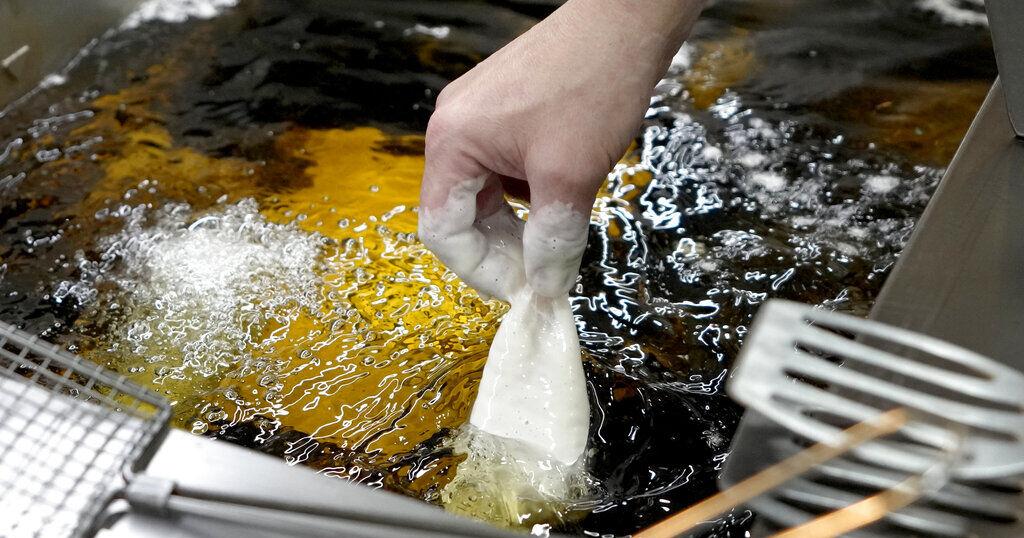Are seed oils bad for you like RFK Jr. says? Louisiana considers a labeling law.

Louisiana lawmakers are considering a bill that would require restaurants to disclose their use of seed oils, a move aligned with claims by Health and Human Services Secretary Robert F. Kennedy Jr. and the “Make America Healthy Again” movement that the cooking oils are harmful.
In a hearing two weeks ago before the Senate Health and Welfare Committee, a pediatrician called seed oils “toxic.” A wellness coach labeled them “inflammatory.”
Sen. Patrick McMath, R-Covington, who authored the bill, also claimed that certain ingredients in seed oils, most commonly referred to as vegetable oils, cause “chronic inflammation, which causes chronic disease.”
But as Sen. Jay Luneau, D-Alexandria, pointed out in the meeting, “we like to fry stuff in Louisiana.” Seed oils — including canola, rapeseed, corn, cottonseed, grapeseed, rice bran, safflower and soybean — have been staples in Louisiana cooking for decades.
Nutrition scientists say they are perplexed by the backlash.
“Seed oils got a bad name for a couple reasons, mostly — I hate to say it this way — but uninformed people on TikTok,” said Dr. Ron Quinton, medical director at Tulane University’s Goldring Center for Culinary Medicine.
Quinton, who spent 40 years as a thoracic-cardiovascular surgeon before leaving to teach nutrition, said seed oils aren’t the problem. It’s that they often wind up on long ingredient lists for packaged foods.
“The real problem isn’t the seed oils themselves — it’s that they are often used in ultraprocessed foods. And ultraprocessed foods cause a lot of different health problems,” he said.
What are seed oils?
The extraction process for seed oils involves pressing and heating the seed, then refining the oil with certain solvents to make it taste better in a process that is “kind of like percolating coffee,” said Joan King, a food chemist at LSU School of Nutrition and Food Sciences.
Soybeans, for example, are pressed into flakes, then heated to destroy an enzyme that interferes with digestion. A compound called hexane is introduced to help purify the oil, removing free fatty acids (which cause a soapy taste), color, and soy lecithin (which can cause allergic reactions in some people).
Nearly all oils undergo some form of refinement, which makes them taste better, look better, last longer and allows cooking at relatively high heat points without smoking. The exception is oils that are cold pressed, though those oils are generally not heat stable and may release harmful chemicals at high temperatures during cooking.
Why are some people against them?
Opponents of seed oils have pointed out that hexane, the chemical solvent used to refine cooking oils, is a neurotoxin. They have also said it is carcinogenic, though it is not recognized as a cancer-causing substance by the U.S. Environmental Protection Agency, National Institute for Occupational Safety and Health or the Agency for Toxic Substances and Disease Registry.
Experts note that hexane all but entirely evaporates during the refining process. The amount of hexane present in food-grade oils is negligible compared to other environmental exposures, like gasoline fumes.
“Once the oil is extracted, it undergoes refining processes involving heat and vacuum (treatment) to remove the remaining hexane,” said Subramaniam Sathivel, a food scientist at LSU Department of Biological and Agricultural Engineering. “As a result, the residue of hexane in the oil is typically very low.”
While hexane is a neurotoxin at high exposure levels, the trace amounts present in refined edible oils are within safety limits set by regulatory agencies and are not considered a health risk, according to the EPA and the Centers for Disease Control and Prevention.
It is also a better alternative to animal fats, which are high in saturated fats, according to scientific literature.
“There have been a lot of scientific studies, probably about 100, comparing vegetable oils and seed oils with animal fat sources such as butter and lard. Almost every one has shown healthier outcomes with the seed oils,” Quinton said.
Healthier than animal fats
Catherine Champagne, a nutrition scientist at the LSU Pennington Biomedical Research Center, pointed out that seed oils are generally healthier than animal fats because they are higher in polyunsaturated fats, particularly omega-3 and omega-6 fatty acids, which our bodies need but cannot produce on their own.
In contrast, animal fats and coconut oil are typically higher in saturated fats, which can be problematic for people with heart disease or blood lipid issues.
Champagne, who helped develop the groundbreaking DASH diet, said she avoids using animal fats because of their documented negative impact on heart health.
“I cook with canola oil because it has a high content of monounsaturated fat — similar to olive oil, both of which are heart healthy.”
The claims that seed oils are inflammatory are also not backed by scientific evidence. A large analysis of studies found no connection between inflammatory markers in the blood and seed oils.
Quinton explained that older studies from the 1970s suggested omega-6 fatty acids, which are present in seed oils, might cause inflammation because they can metabolize into arachidonic acid, an inflammatory substance. However, he noted that more recent research disproves this concern.
“The amount of omega-6s metabolized into arachidonic acid is limited by the body. So the more omega-6s you eat, doesn’t mean the more arachidonic acid,” he said.
“In fact, omega-6 fatty acids actually reduce heart disease, reduce diabetes, and are healthier than what I was taught when I was in medical school quite a few years ago.”
Seed oil disclosure is just one part of the bill. Other parts of the bill limit soft drinks for SNAP recipients, ban certain ingredients in ultraprocessed foods from school meals, and require more nutrition education for physicians — the last two of which Quinton said he supports.
Sen. McMath emphasized that the proposed labeling requirement is a tool for consumer transparency.
“It’s not a warning, it’s a simple notification,” said McMath in the meeting.
The bill passed through the Senate with the vocal support of Kennedy Jr., Gov. Jeff Landry and Surgeon General Dr. Ralph Abraham. It is now awaiting scheduling for the House Health and Welfare Committee.


